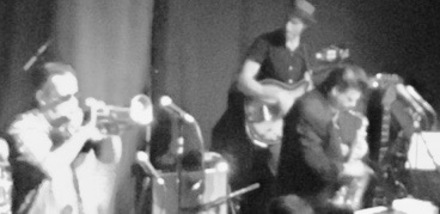James Chance still doesn't belong anywhere. Same as in '78, the No Wave saxist-grunter frowned at the floor in a clown pompadour. But as David N. Meyer observed, Chance's comedy act -- self-loathing white runt parodies James Brown -- has transformed from culture clash to arty party. And he can't invite himself.
The rest of us danced anyway. Opening with the deadly jumpfunk of "Design To Kill," Chance reminded us that hating others and despising oneself -- "You're useless, ain't got no excuses" -- amount to the same thing, but by now, thanks to the efforts of David Byrne and Beck, the all-white audience had become long accustomed to reveling in our lameness. The nervously grooving "Contort Yourself" similarly hyped the virtues of self-flagellation well learned by the Catholic-raised Chance. And on "Almost Black," Chance brought back a sharp-dressed old female foil to parry lines such as "He's got some moves -- but they ain't right."
Those were the hits, and Chance naturally closed with his steaming take on Brown's "Cold Sweat," but he revealed more in his choice of less obvious covers. Although his weary version of the Sinatra bragger "That's Life" shipped a ton of defeat, the realization that this onetime over-and-out junkie had surged back in the race did leak a trickle of triumph. The Italian bathosphere "I Who Have Nothing," reconstituted in 1963 by Ben E. King via Leiber & Stoller, had us laughing at Chance's self-pity while pitying his self-laughter. One thing about this ingenious basement dweller, he can get you to like him.
Chance's one misstep, apparently a recent addition because he read it off a music stand, was a rambling rant about that guy in the White House. Leaden and literal, that's one notebook he can lose on the train.
Although he explained that he'd just damaged an arm when squashed in an airplane seat, Chance blew his alto frequently and with vintage ferocity. He also dashed off a few dissonant electric-piano runs, which, though he wanted them to seem random, hit the rhythmic pocket like a nailgun. He did the same with his mumbly yet percussive voice on "Life" and "Nothing," avoiding the templates' accents but unerringly selecting his own counterbeats. Like jazz. Flicked his wrist in time, too.
The ironically short-sleeved veteran band (couldn't hear their names) rocked the pocket like pros, with the omnipresent trumpeter deserving special notice for his tense swing and the deft way his squealing high notes mirrored Chance's.
Having spun out of one era, James Chance maintains a dark orbit around the periphery of the present time, a time he helped misshape. Good.
* * *
PHOTO BY DEBI DOORZ.

